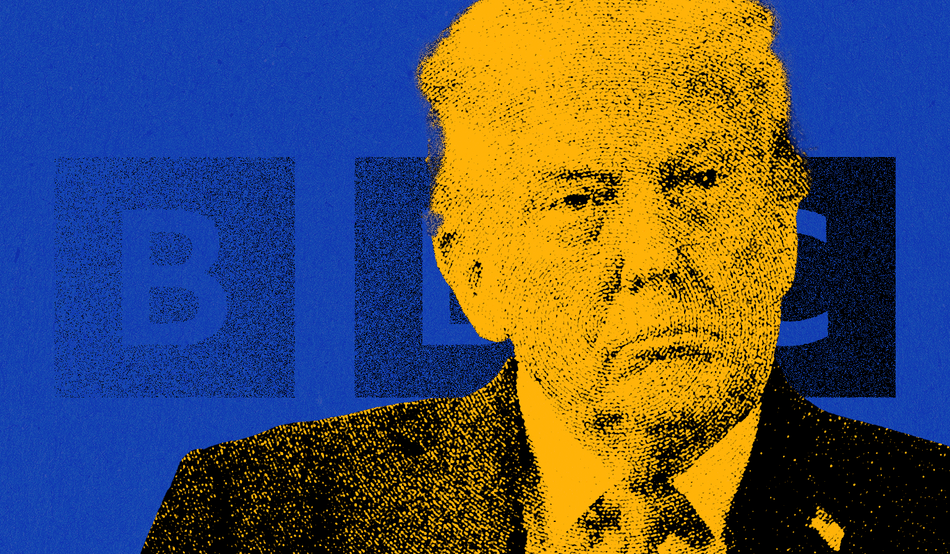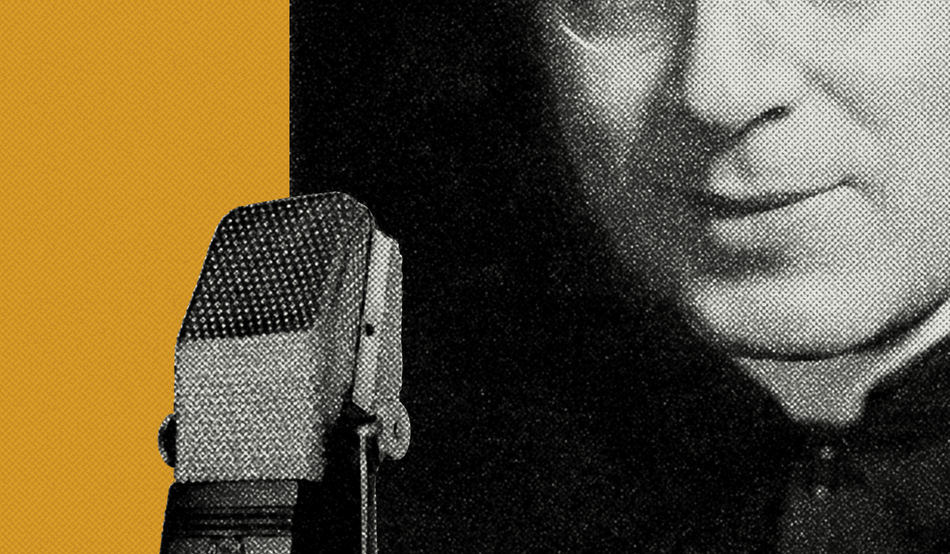The Panorama film which led to the resignations of the BBC’s director general and head of news is now the subject of a multi-billion-dollar lawsuit from Donald Trump. The film is no longer available on BBC iPlayer, but Prospect asked two distinguished Pulitzer Prize-winning US journalists to view a copy and offer a professional opinion on the programme.
Bill Keller: ‘This does not feel like a hanging offence… Viewed today, the documentary seems prescient.’
If, like me, you missed the October 2024 episode of BBC’s Panorama, you may well have wondered about the fallout it engendered: the resignations of two of the broadcaster’s top executives, a billion-dollar defamation suit filed by the United States president, and a chorus of commentary suggesting that one of the world’s most respected news organisations faces an existential crisis. Was the offending broadcast really a crime against journalism, or did the BBC surrender too timidly to the bully in the White House? As part of the ritual of remorse, the BBC has erased the Panorama episode from all of its platforms, but a friend who managed to obtain a bootleg copy shared it with me, and I settled in to see for myself.
The Panorama programme, “Trump: A Second Chance?”, was an hour-long documentary tick-tock of the extraordinary 2024 presidential campaign, told in news footage with analysis from journalists, academics, politicians and voters on both sides. The narrative focused—rightly—on the phenomenon that is Donald Trump, who aggressively defied the norms of democracy and confounded precedent. He was indicted on criminal charges, survived an assassination attempt, made unsubstantiated claims of election fraud, spouted racist and xenophobic tropes, and promised, if elected, massive deportations and vengeful political purges. The documentary does not flatter Trump's opposition (Joe Biden’s cognitive impairment is conveyed by an excruciating excerpt of his debate meltdown.) But the programme was, above all, an attempt to explain how such an outlandish figure as Trump had reached the brink of a second presidency. Panorama met that challenge better than many American news outlets, with close attention to the alienation and populist grievance of Maga voters. Viewed today, the documentary seems prescient.
The controversy focused on roughly 20 seconds of extracts of Trump’s speech preceding the storming of the US Capitol on 6th January 2021, During that address (which, unlike the Panorama film, is widely available online), he told supporters: "We’re going to walk down to the Capitol, and I’ll be there with you.” Nearly an hour later, after a rambling list of grievances including unsubstantiated claims of voter fraud and calls for his vice president to subvert the electoral vote counting, he said: “And we fight. We fight like hell. And if you don’t fight like hell, you’re not going to have a country anymore.”
In the Panorama programme these two separate clips are spliced together: “We’re going to walk down to the Capitol... and I’ll be there with you. And we fight. We fight like hell.” The 50-odd minutes omitted in Panorama’s edit included a passing appeal for the protesters to “peacefully and patriotically make your voices heard.” (They also included another ten uses of Trump’s favourite verb, “fight.”)
The integrity of direct quotes is a basic rule of journalism. A writer can make minor edits using brackets [like this] to correct grammar or to add context without changing the source’s original meaning. Journalists often paraphrase quotes to remove errors or improve clarity.
In a statement responding to the controversy, the BBC said, “We accept that our edit unintentionally created the impression that we were showing a single continuous section of the speech, rather than excerpts from different points in the speech, and that this gave the mistaken impression that President Trump had made a direct call for violent action.” Such a correction, promptly published, and a reprimand in the file of the editors responsible, would probably have satisfied a reasonable standard of accountability. Based on the public record, this does not feel like a hanging offence.
The debate overlooks the indisputable reality that Trump inspired, energised and then celebrated a violent attempt to thwart an election.
Whether the edit was intended to emphasise Trump’s complicity in the Capitol attack or was simply a lazy effort to condense a typically meandering Trump monologue into a coherent soundbite, it was an unnecessary own goal. By focusing on an ethical misdemeanour, the debate overlooks the indisputable reality that Trump inspired, energised and then celebrated a violent attempt to thwart an election. Any doubts on that score were dispelled a few weeks after the Panorama broadcast. On the first day of his second term as president, Trump began the process of pardoning hundreds of the rioters convicted of crimes committed on 6th January, many of them violent crimes. He describes the Capitol attackers as patriots, hostages and political prisoners.
Trump is unlikely to prevail in his defamation suit. American libel law is protective of journalism and political speech, and the BBC—unlike some American media giants—does not seem inclined to pay to settle scores with the US president. But the last thing the BBC needs, as it wrestles with conservative charges of institutional bias and questions about its taxpayer funding in the era of abundant free news sources, is a self-inflicted wound to its credibility.
Lowell Bergman: ‘Making an editing mistake is not a capital offence, nor proof of putting your thumb on the scale.’
I was asked to view the BBC documentary, “Trump: A Second Chance?”, which I am told is no longer publicly available. A copy was shared with me. I have viewed it to try to determine whether it exhibits serious ethical or potentially defamatory content.
Other than my familiarity with the resignations at the BBC, and the threat by President Trump to sue for billions—he always uses big numbers—I was not familiar with the film and did not watch it until a few days ago.
I expected to see something bordering on a hatchet job, given the threat of a multi-billion-dollar libel action by a public figure, a designation that is virtually automatic in the case of a president. Such cases will usually be dismissed almost automatically by a US court.
I was surprised, after viewing the film, that the threatened cause of action was an editing issue, and knowing the BBC, one which had obviously been missed by those who reviewed the film prior to broadcast.
Ethically, it might have been useful for the BBC to have either revealed the edit in question—perhaps in a post-broadcast note—or simply fixed it, and released a “revised” version along with the apology that I now understand they have offered.
What surprised me about the film is that it includes throughout the voices of Trump’s supporters as well as a Trump public affairs staff member, who repeatedly defends the president. The film also includes commentary (through a colleague of mine, a professor here at the University of California, Berkeley) on the powerful methodology that President Trump has developed over the decades, and which has led to his tens of millions of followers who take the trouble of voting for him.
Making an editing mistake is not a capital offence, nor proof of putting your thumb on the scale.
The film, as a whole, spends much of its time demonstrating Trump’s talents, especially his ability to communicate in a way that has brought about a dramatic change in politics here and globally.
I have now read that a BBC adviser has been highly critical of the film, claiming bias. All major broadcasters such as the BBC have standards and practices. Making an editing mistake is not a capital offence, nor proof of putting your thumb on the scale.
Coming from a similar tradition in broadcasting and documentary film, the inadvertent editing mistake can, especially in the digital age, easily be corrected.
As for the threatened billion-dollar suit in the United States, Trump knows the routine well. Proving malice is extremely difficult. He knows because he often threatens, rarely sues and has never won in court. We do know he has a long tradition of threatening and has used his political clout to lean on publishers. It’s that practice and his willingness to use pressure on other governments, whether it’s through tariffs or sanctioning foreign government officials, that we need to worry about.
It was the use of political power—Federal Communications Commission (FCC) approval of a transaction involving the sale of CBS to his friends—that resulted in a similar lawsuit over the edit of soundbites by 60 Minutes being settled for $16m. Anything like that happening in this instance that would result in damaging the BBC would be a tragedy.
Alas, all of this is without precedent, and presents an ongoing threat to serious reliable journalism in the public interest, in this case on both sides of the pond.












